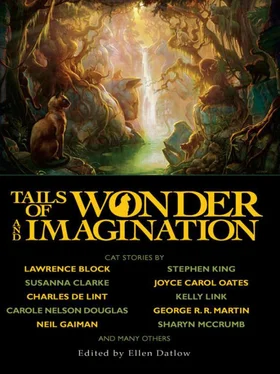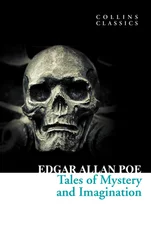Ellen Datlow - Tails of Wonder and Imagination
Здесь есть возможность читать онлайн «Ellen Datlow - Tails of Wonder and Imagination» весь текст электронной книги совершенно бесплатно (целиком полную версию без сокращений). В некоторых случаях можно слушать аудио, скачать через торрент в формате fb2 и присутствует краткое содержание. Год выпуска: 2010, ISBN: 2010, Издательство: Night Shade Books, Жанр: Фэнтези, Фантастика и фэнтези, Ужасы и Мистика, на английском языке. Описание произведения, (предисловие) а так же отзывы посетителей доступны на портале библиотеки ЛибКат.
- Название:Tails of Wonder and Imagination
- Автор:
- Издательство:Night Shade Books
- Жанр:
- Год:2010
- ISBN:978-1-59780-170-6
- Рейтинг книги:5 / 5. Голосов: 1
-
Избранное:Добавить в избранное
- Отзывы:
-
Ваша оценка:
- 100
- 1
- 2
- 3
- 4
- 5
Tails of Wonder and Imagination: краткое содержание, описание и аннотация
Предлагаем к чтению аннотацию, описание, краткое содержание или предисловие (зависит от того, что написал сам автор книги «Tails of Wonder and Imagination»). Если вы не нашли необходимую информацию о книге — напишите в комментариях, мы постараемся отыскать её.
collects the best of the last thirty years of science fiction and fantasy stories about cats from an all-star list of contributors.
Tails of Wonder and Imagination — читать онлайн бесплатно полную книгу (весь текст) целиком
Ниже представлен текст книги, разбитый по страницам. Система сохранения места последней прочитанной страницы, позволяет с удобством читать онлайн бесплатно книгу «Tails of Wonder and Imagination», без необходимости каждый раз заново искать на чём Вы остановились. Поставьте закладку, и сможете в любой момент перейти на страницу, на которой закончили чтение.
Интервал:
Закладка:
I’d promised him I would wake him when it came back. I called his name sharply, and Arthur opened his eyes, instantly fully conscious. “Is it there?”
“Across the room by the window.”
The moon had gone, but the low-burning electric light illustrated the lion as accurately as its initial paint.
It did not look at him or me. It looked about itself at the massively furnished room. Then it padded away, across the floor, and nudging open the bathroom door, went inside.
In the total noiselessness of the night, Arthur and I listened as it drank from some trickle of water, real or etheric, issuing from the taps of the bath.
When it had finished, it returned, not through the door, but simply out of the wall. It stood, its heavy head lowered, its tail swinging.
Something struck me then. I couldn’t have described it. But abruptly I saw the cruelty in its face was only instinct, and perhaps the pain from the stripes on its side, which anyway looked partly cured. It was an animal of sorts, at least. It was hungry, and had been thirsty, and chose sometimes to use a door rather than pass through a blank floor or wall.
So then I spoke to it, by its name. “Lion.”
It made a snorting noise, and turned, and looked at me, that terrible look, the hellish eyes that were really only reflecting light.
“There he is,” I said to it. “There. Look there.”
And the head again turned as if it grasped my meaning. And I saw Arthur brace himself. I said to Arthur then, “It’s yours. You made it. You gave it life. You’re—you’re like a father to the damn thing, Arthur. Stop resisting it, do you hear? It’s your belonging now, whatever it was to start with. It doesn’t want to drag you back into the shadows—if it did it would lose all this new territory you’ve given it. I’m fairly sure it knows that, or it would have done it by now. After all, it’s had a couple of months to try. First you gave it the Roman arena to play in. But now its got a whole house—and anything outside it fancies too. Why do you think it goes off and leaves you? It goes exploring like a bloody cat. And why do you think it follows you, comes back to you? If it isn’t for violence, it must be something else. Maybe that’s where it is like a dog. It knows, if you don’t, it belongs to you.”
The lion, with no warning, sprang. It was too quick for Arthur even to cry out, even to register his fear. It landed, and balanced on his bed, at the foot of it, gazing at him, breathing.
I crossed the room in three strides and pushed it hard in its unmarked side—except there was nothing, nothing substantial to push—but with a grunt it dropped, and flopped down. It lay there sprawled.
It blinked at me, growling.
“Be quiet,” I said. “You must do as you’re told. If you want to stay, you must behave yourself.” The growl changed to a yawn.
We remained watching it, Arthur bolt upright on the pillows, I standing at the bedside, and after a while it lowered its head on to the coverlet. The horror of its eyes shut.
After that, we kept vigil till first light, talking slowly and methodically, discussing it, over its sleeping form, Arthur not moving an inch, I static in a chair. When dawn began to seep in, the lion woke and rose. It kicked its paws and jumped off the bed—and vanished.
At ten to seven some tea was brought up by a maid, and I went down to telephone the town, reporting my absence as due to food-poisoning.
The lion was standing in the echoing hallway when I turned, looking off along a corridor to a narrow, opened door. The morning smelled enticingly there, of trees and mist, and bonfires. While the open door, since the lion could utilize blank walls for exits and entrances, was presumably an aesthetic choice. Outside lay the grounds, with plenty of game—mice and squirrels, birds, rabbits and hares. Any big animal could hunt for itself if it wanted, although I doubted any of the hunted things would suffer much worse than a nasty shock. The lion, though it was visible and could create smell and sound, had no actual substance. But, like the bath-taps, which didn’t leak but had provided water, an idea was conceivably enough for it to feed from. A beast of imagination in more than one way. Arthur’s beast, very apparently. Even as I watched, it made a decision and bounded off along the corridor and out of the open door. Hungry—well, it had had to wait several decades for a meal.
Needless to say, I recounted nothing of any of this when I reached the theatre the next day. My assistant had managed pretty ably without me, and all was soon put in order. I meanwhile secured myself a room in the local hotel.
Arthur survived another twenty-five years, and died without warning, but peacefully, during a fishing holiday in Scotland with one of his partners in the marmalade venture. There had been some talk of a large ghost dog, I believe, being seen often about Blue Firs, and also in other houses where Arthur visited. A slight mythology had connected itself to my uncle, who, apparently, was once or twice spotted, as witnesses thought, throwing sticks for some large hound, in a selection of rural retreats. In Scotland, years before he died, there was a strange story of something lying on the foot of his bed, purring—but it had disappeared by the time others came to investigate. After Arthur’s death, the beast vanished completely, at least according to his housekeeper. Blue Firs is now, I rather ashamedly admit, mine, but I am seldom there. Nevertheless, those who rent the property relate nothing either of dogs, cats or lions.
From Arthur, in the years before his death, I heard very little of anything, and less of his creature. With his renewed sense of safety, our “estrangement” had recurred, which seemed to suit us both. Only a postscript appeared now and then to a rare letter: The lion is in good spirits. Anyone reading this correspondence might take it that Arthur referred sportively to himself. People told me afterwards my solitary visit had done him a power of good.
He had thrown off at once his old timidity and depression, and the recent bad nerves. Instead he took to long, hale walks, and large cuts of meat served almost raw at dinner—though these were barely touched. Sometimes, when alone, he would, it seems, laugh aloud. He informed anybody who asked him, it was at something he had read in a newspaper.
Naturally I have no knowledge of where either of them is now For myself, I assume life ends with the body. But then again, perhaps there are some mind-fashioned heavens in which certain mentally creative people continue to exist. If so, I don’t think for a moment Arthur and his lion are now locked back in any Roman arena. He freed the lion, and ultimately was set free by it. Trite in the paucity of my own imaginative knack, I see them bounding along a seaside, Arthur a gleeful kid of seven, wiry, healthy and tough, and with a great, black-maned dog, scarred a little on one flank, whose claws flash like silver hooks, and leave starry markers on the clean, unearthly sand of the shore.
PRIDE
Mary A. Turzillo
Mary Turzillo’s fiction has recently appeared in Analog , Year’s Best Lesbian Fiction 2008 , Cat Tales , Space and Time , The Vampire Archives , and Sky Whales and Other Wonders . She has published about fifty stories in magazines and anthologies and her poetry is collected in Your Cat & Other Space Aliens . Her Nebula winning “Mars Is No Place for Children,” and her novel An Old-Fashioned Martian Girl have been selected as recreational reading on the International Space Station.
Читать дальшеИнтервал:
Закладка:
Похожие книги на «Tails of Wonder and Imagination»
Представляем Вашему вниманию похожие книги на «Tails of Wonder and Imagination» списком для выбора. Мы отобрали схожую по названию и смыслу литературу в надежде предоставить читателям больше вариантов отыскать новые, интересные, ещё непрочитанные произведения.
Обсуждение, отзывы о книге «Tails of Wonder and Imagination» и просто собственные мнения читателей. Оставьте ваши комментарии, напишите, что Вы думаете о произведении, его смысле или главных героях. Укажите что конкретно понравилось, а что нет, и почему Вы так считаете.












